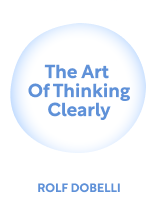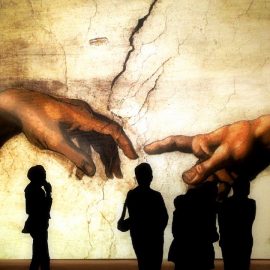

This article is an excerpt from the Shortform book guide to "The Art of Thinking Clearly" by Rolf Dobelli. Shortform has the world's best summaries and analyses of books you should be reading.
Like this article? Sign up for a free trial here .
What is hindsight bias? Why does the predictability of the outcome seem higher in hindsight?
Hindsight bias is where you—upon knowing the outcome of an event—overestimate your ability to have predicted it. According to Rolf Dobelli, the author of The Art of Thinking Clearly, hindsight bias is a by-product of the brain’s pattern-finding tendencies.
Here’s why things seem clearer in hindsight.
The Psychology of Hindsight Bias
What is hindsight bias? The hindsight bias makes unpredictable past events seem like they should have been easily predictable: People see an obvious pattern of circumstances that led to a past event occurring, and they think people should have noticed that pattern and predicted the event. At the time, though, the pattern wasn’t clear, so people couldn’t use it to predict the event. It’s only with hindsight that the pattern becomes clear.
For example, take the sinking of the Titanic. Looking back, there’s a pattern leading to the disaster, including weak construction and little lifesaving equipment. At the time, however, the pattern wasn’t clear. The construction seemed standard because no one anticipated extreme collisions, and the ship lacked equipment because the officer with the key to the storage room transferred off the ship. On top of these human influences, bad weather made conditions more dangerous. Thus, chance played a major role in the disaster. The “obvious” pattern of events people point to today is an example of hindsight bias.
Hindsight bias encourages overconfidence, Dobelli says. You think you’re good at detecting patterns when really, you’re not: You’re only seeing them because of hindsight. When you try to apply these pattern-spotting “skills” to predicting the future, you fail. (Shortform note: This overconfidence is dangerous when your inaccurate predictions affect your livelihood. For example, you might think you see successful patterns and invest in a company that fails. Because you were overconfident, you didn’t notice any warning signs that the investment wouldn’t work out.)
To avoid overconfidence, Dobelli recommends journaling your expectations and comparing them to reality. Because your expectations will often be incorrect, having a record of them forces you to accept your own inaccuracy. (Shortform note: Journaling also forces you to accept uncertainty by making you realize that you can’t really predict things. The more accepting you are of uncertainty, the less hindsight bias affects you.)
| Hindsight Bias and Memory Dobelli credits hindsight bias to people’s pattern-finding tendencies, but memory plays an important role in this fallacy as well. Hindsight bias changes your memories, making you think you always knew what was going to happen. Your brain can alter your memories because of how it handles predictions: When shown two possibilities, your brain creates reasons why both are possible. Once Possibility A occurs, your brain doesn’t need to remember Possibility B. It forgets that information, making you believe Possibility A was obvious all along. This altered memory also creates overconfidence. You forget any prior uncertainty or incorrect predictions, which reinforces your overconfidence about your pattern-finding and prediction abilities. |

———End of Preview———
Like what you just read? Read the rest of the world's best book summary and analysis of Rolf Dobelli's "The Art of Thinking Clearly" at Shortform .
Here's what you'll find in our full The Art of Thinking Clearly summary :
- A detailed look at the most common logical fallacies that inhibit decision-making
- How to recognize and overcome these fallacies to make better decisions
- Why you value things for arbitrary reasons






